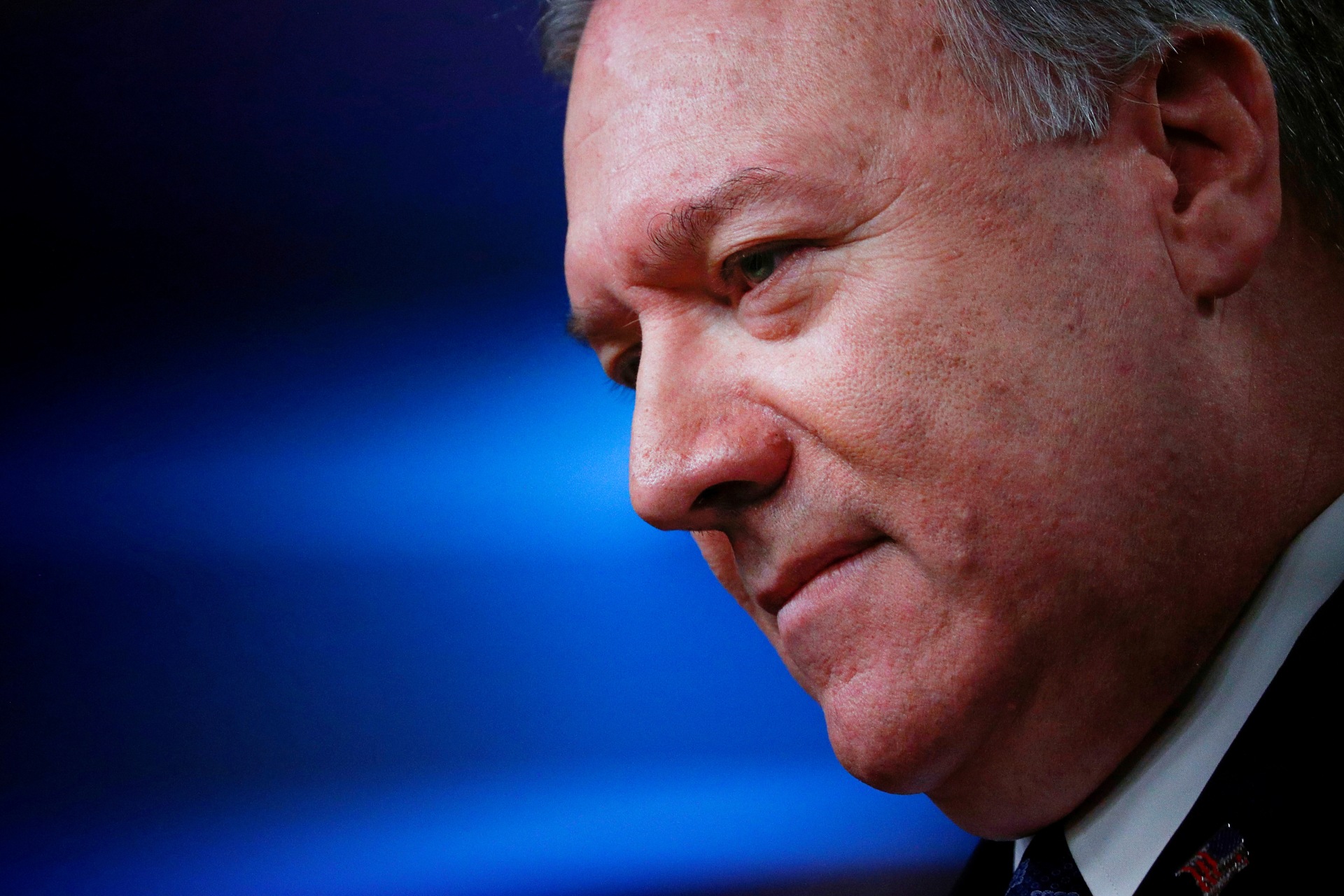Pompeo’s Departure Is Restoring the State Department’s Swagger
The U.S. secretary of state appears to have one foot out the door—and that’s exactly what U.S. diplomats have been waiting for.

By experts and staff
- Updated
Experts
![]() By Steven A. CookEni Enrico Mattei Senior Fellow for Middle East and Africa Studies
By Steven A. CookEni Enrico Mattei Senior Fellow for Middle East and Africa Studies
This article first appeared here on ForeignPolicy.com on December 4, 2019.
A few days before Thanksgiving, the U.S. assistant secretary of state for Near Eastern affairs, David Schenker, spoke out forcefully in support of political and personal rights in Egypt. He told a room full of reporters at the State Department that the United States “raised” the issue of human rights with Egypt’s leaders, “urged” them not to use the law restricting nongovernmental organizations to stifle civil society, “called on” the Egyptians to respect freedom of the press, and “takes seriously” the treatment of American citizens detained in Egypt. By measure of the Trump administration’s attention to these issues, the criticism of the president’s “favorite dictator” by a senior official was conspicuous.
Has Schenker gone rogue? Not quite—it’s less a rebellion than a halting return to normal. Schenker, like other U.S. diplomats, is starting to fill the void increasingly left by Secretary of State Mike Pompeo’s political aspirations in Kansas and President Donald Trump’s impeachment crisis in Washington. The U.S. State Department is starting to get what Pompeo refers to as its “swagger” back—though not through Pompeo’s efforts, but rather because he intends to leave.
Good on Schenker for speaking out on issues Trump and Pompeo have preferred to leave unaddressed. Although the Trump administration originally docked the Egyptians $100 million in military assistance over human rights concerns, those restrictions were soon lifted after Pompeo replaced Rex Tillerson as secretary of state. And while the secretary has decried human rights violations in Venezuela, Cuba, Iran, and China, he has generally been permissive of bad Egyptian behavior during his tenure.
When Pompeo left his role as CIA director to become the 70th secretary of state of the United States last year, there was palpable excitement among foreign service officers and civil servants at the State Department. Pompeo was known to be close to the president—unlike Tillerson—and made clear his intention to reenergize U.S. diplomacy. He went as far as calling the State Department the “Department Of Swagger,” declaring, “Swagger is not arrogance; it is not boastfulness, it is not ego. No, swagger is confidence; in one’s self, in one’s ideas. In our case, it is America’s essential rightness. And it is aggressiveness born of the righteous knowledge that our cause is just, special, and built upon America’s core principles.”
Tillerson left the department moribund after peremptorily dismissing senior diplomats and attempting to manage U.S. foreign policy with a small group of people around him. Stories of empty desks and highly trained foreign-policy professionals looking for work were soul-crushing for those who remained at Foggy Bottom. It was also a problem for the United States. Incapacitating the State Department undermined relations with allies as U.S. foreign policy drifted into incoherence. Pompeo’s energy promised to give the diplomatic corps a lift, and it did, but only briefly.
In time, the State Department resumed its Tillersonian decline. It went months without a spokesperson, and the president’s penchant for changing course and making policy on the fly forced the department to constantly play catch-up. Then there was the separate policy channel on Ukraine adding to already well-established informal channels associated with Trump’s son-in-law and senior advisor Jared Kushner and Saudi as well as Turkish officials. The shabby way Pompeo treated well-respected diplomats such as Marie Yovanovitch, the former ambassador to Ukraine who was summarily dismissed in May, was another blow. All of this underscores that Pompeo’s “swagger” never got much beyond his first few weeks in office and may have had more to do with his own political ambitions rather than rebuilding the State Department. All the while, the drift has continued, as the president’s Twitter feed increasingly supplants the formal foreign-policy process. As a result, there are few in Washington or anywhere else in the world who can say with confidence what U.S. foreign policy is and what it stands for. This provides opportunity for mischief among friends and foes alike.
Now, with rumors that Pompeo is leaving to make a Senate run, the State Department might actually get its swagger back. Schenker recently took the Iraqi government to task in a blistering statement on its use of violence against unarmed protesters, though the secretary and Trump, neither of whom has evinced much interest in Iraq, have remained quiet. It is not just Schenker (who is a political appointee rather than a career diplomat), however. In November, William Roebuck, a senior advisor to the special representative for Syria engagement, caused quite a stir when parts of a memo he wrote assailing the Trump administration’s response to Turkey’s invasion of Syria were published in the New York Times. The veteran foreign service officer minced no words in a memo addressed to the special representative, James Jeffrey, as well as a variety of other officials at the Pentagon and White House:
“One day when the diplomatic history is written people will wonder what happened here and why officials didn’t do more to stop it or at least speak out more forcefully to blame Turkey for its behavior: an unprovoked military operation that has killed some 200 civilians, left well over 100,000 people (and counting) newly displaced and homeless because of its military operation.”
It was a damning critique coming from a surprising place: the demeaned and allegedly cowed professionals at the State Department. Of course, there has long been a mechanism for diplomats to express their concerns about U.S. policy. But given this administration’s clear preference for loyalists and conspiracy theories about a so-called deep state seeking to undermine the president, both Schenker and especially Roebuck are being bold. Contrast these recent assertive statements to the virtually nonexistent (at least in public) criticism from State Department officials of Hungary’s Viktor Orban when he visited the White House back in May. That was when the idea of Pompeo’s Senate run was just a distant rumor—now he’s seen as having one foot out the door.
No doubt, Schenker would protest that he is not diverging from administration policy or Pompeo’s views, and Roebuck would say that he is carrying on a long and laudable tradition of internal dissent. And a few anecdotal cases are hardly a trend, but both diplomats have offered a glimpse of what a principled and coherent U.S. foreign policy might look like. Let’s hope Schenker and Roebuck are the leading edge of some new, much needed, actual swagger at the Department of State.
